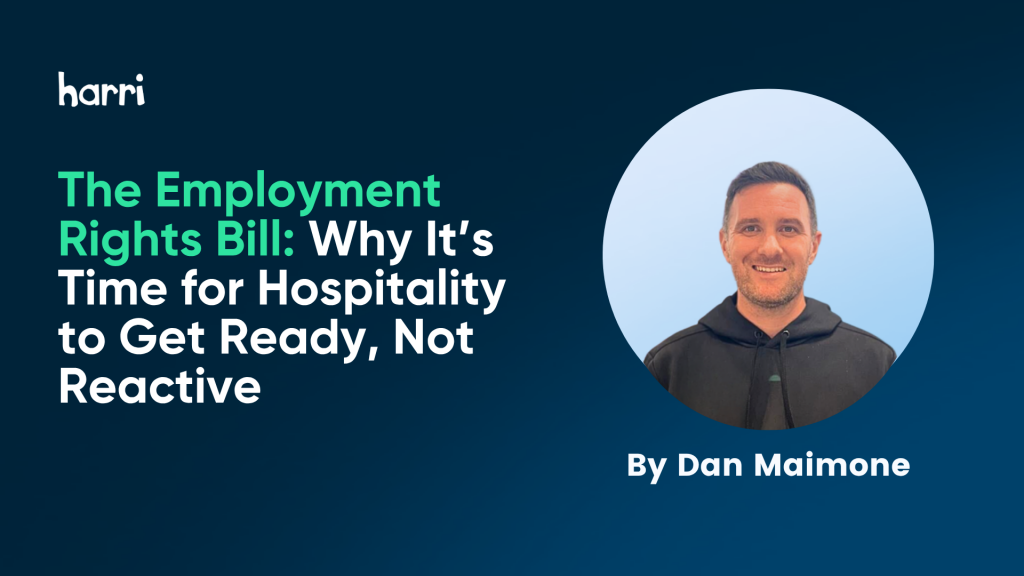The Employment Rights Bill: Why It’s Time for Hospitality to Get Ready, Not Reactive

- By Harri Insider Team | November 3, 2025
By Dan Maimone, Head of Customer Experience at Harri
The Employment Rights Bill might sound like another distant piece of Westminster paperwork, but for those of us who run teams, build schedules, and balance cost pressures in hospitality, it’s about to hit very close to home.
Over the next 12 to 18 months, the Bill will reshape the way we think about people, performance, and pay. Some see it as a challenge. I see it as a wake-up call. Because if we handle it right, it can push the industry to finally modernise how we manage our teams, not just to stay compliant, but to operate smarter.
What’s Changing
The Bill is part of the government’s wider plan to “make work pay,” but the biggest ripple effects will be felt in sectors that rely on flexibility and high headcount. Hospitality sits right at the centre of that.
Here’s what’s on the table:
Sick pay from day one. The traditional four-day waiting period is expected to be scrapped, meaning operators will shoulder the cost of absence from the first day. In an industry where absence is already higher than average, that’s not a small adjustment, it’s a shift in mindset and budgeting.
Unfair dismissal rights from day one. The current two-year qualifying period would go, meaning employees can claim unfair dismissal protection as soon as they start. For operators who often hire quickly and seasonally, that will make documentation, training, and probation management far more important.
Greater predictability of shifts. There’s a push to give staff clearer notice of shifts, limit last-minute cancellations, and potentially require guaranteed hours for regular patterns of work.
Flexible working from the start of employment. Employees could request flexibility from day one, which sounds simple but adds complexity to rota planning and consistency of service.
Taken together, this is the most significant shift in employment law for hospitality in a decade.
What Operators Are Worrying About
When I talk to operators across the UK, the same themes come up again and again.
Cost and uncertainty. Margins are already razor thin. With sick pay from day one, there’s concern about a rise in absence costs, and not just the payroll impact, but the knock-on effects of covering shifts, hiring cover, and managing burnout among remaining team members.
Loss of flexibility. Hospitality thrives on adaptability. You might have a packed booking sheet at lunchtime and a quiet floor by dinner due to a train strike or bad weather. If shift predictability rules become rigid, that agility could be lost, forcing operators into overstaffing or paying penalties for last-minute changes.
Manager readiness. Many site-level managers are brilliant at running restaurants and delivering guest experiences, but haven’t been trained for the admin and legal accountability that this new Bill will bring. A good portion of the industry still runs on paper schedules and spreadsheets. Under the new regime, that’s going to be a problem.
Fear of overcorrection. Some worry that businesses will overreact, becoming risk-averse about hiring young or inexperienced staff. That would be a real shame, because hospitality has always been an entry point for young people and career changers.
The Practical Reality
Let’s be honest: most operators don’t have the luxury of an in-house legal team. The real question isn’t “what does the Bill say?”, it’s “what does it mean for a Tuesday morning when two chefs call in sick?”
The reality is that success here won’t come from legal knowledge alone; it will come from better data, clearer communication, and sharper forecasting.
Step one: Know your numbers.
Do you know your true absence rate per site? How many shifts are being cancelled each week, and what’s the cost? How often do managers amend schedules last minute? These aren’t compliance questions, they’re operational performance indicators. Without visibility, every new rule will feel like a threat instead of an opportunity.
Step two: Modernise your systems.
If your scheduling, HR, and payroll systems don’t talk to each other, you’re flying blind. The operators that will thrive are those who can see labour costs, absence, and shift predictability in one place, in real time. It’s not about tech for tech’s sake. It’s about freeing managers from firefighting.
Step three: Train your managers differently.
Policies won’t matter if the person writing the rota doesn’t understand them. This means more training around documentation, conversations, and communication, teaching managers how to explain decisions clearly, how to document absence and performance properly, and how to manage fairly while still protecting the business.
Step four: Audit your contracts.
Many businesses have a mix of zero-hour, part-time, and variable-hour contracts. Now’s the time to review them. Where there are people consistently working the same pattern, they may soon be entitled to guaranteed hours. It’s better to get ahead of that voluntarily than have it imposed later.
What Might Go Wrong
Every reform brings good intentions and unintended consequences. This one will be no different.
- Hiring slow-down. Employers may take longer to offer permanent contracts, relying more on probationary or agency staff.
- Reduced flexibility. Managers could become overly cautious about changing shifts or cancelling hours, leading to inefficiency and frustration on both sides.
- Manager burnout. As documentation and HR admin increase, operational leaders may find themselves spending more time behind screens and less time leading teams.
- Investment trade-offs. Businesses might have to delay other initiatives, training, refurbishments, innovation, just to fund new obligations.
If not managed carefully, these changes could squeeze both profitability and culture.
Where the Opportunity Lies
Despite all that, I genuinely believe there’s a silver lining here.
The Bill forces us to get better. It challenges the industry to become more professional, data-driven, and people-centered, to stop treating scheduling, absence, and contracts as background admin, and start treating them as business levers.
- Better scheduling means better cost control.
- Better absence management means healthier, more reliable teams.
- Better communication means fewer misunderstandings and grievances.
If handled well, the Bill could actually improve retention, engagement, and reputation across the sector. That’s something we should all want.
A Call to Action
For leaders in hospitality, this isn’t a time to panic, it’s a time to prepare. The next 12 to 18 months are a window to get your house in order before these changes arrive.
Talk to your managers. Look at your data. Review your contracts. Audit your systems. If you can answer questions like “how predictable are our shifts?” and “how often are we paying sick pay from day one already?”, you’re already ahead of the curve.
This isn’t about compliance for the sake of compliance. It’s about building resilience into how we operate, protecting the people who make our businesses thrive, and giving leaders the clarity to plan with confidence.
Hospitality has weathered bigger storms than this one. The difference now is that the operators who combine empathy, good data, and strong management will be the ones that come out stronger.
The Employment Rights Bill isn’t just another regulation to survive. It’s a chance to redefine what good employment looks like in hospitality, fair, flexible, and future-ready.





















